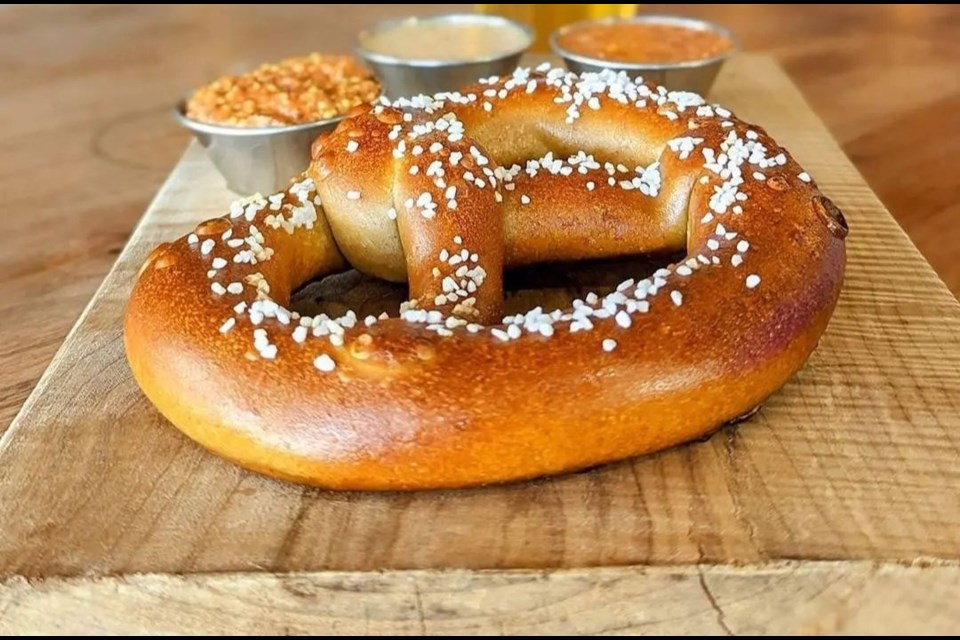If you are a regular at the local eating joints Paddlewheeler Pub on Quayside Drive or Another Beer Co. on Capilano Way, there is a good chance you have tasted baker Alida Dube’s handmade pretzels.
They have earned rave reviews from those who have taken generous bites of the soft and buttery grub, which Dube wholesales to pubs and breweries in New West and Vancouver.
However, not all know or understand that Dube's pretzels are made with a rather unique ingredient: upcycled barley flour.
Upcycled flour, which Dube sources from Vancouver-based company Susgrainable, is made with ‘spent barley grain.' It’s barley, but that which has been used thoroughly by breweries to first make batches of beer.
According to Susgrainable's website, as part of the brewing process, all the sugar from the barley is extracted for the beverage. Once all the sugar is taken out, the spent barley is left behind with little purpose, and so is usually given away to farms (like what Another Beer Co. does), or waste management companies (as what Steel & Oak Brewing Co. practises).
But Dube’s pretzels show the grains can continue to be part of the food cycle for longer.
On coming up with a pretzel recipe with spent grain flour
The flour made from spent barley adds a complex nutty and malty flavour to the bread; it's a recipe that she took half a year to perfect. Unlike the countless recipes that are available on the internet for making bread with normal flour, there aren’t many for making bread with spent grain flour, she said.
Naturally, “it was very challenging” for Dube to arrive at a recipe that tastes good and has the right nutrition and texture.
The challenge with using spent grain is that it is extremely fibrous — since it’s sprouted barley that’s then roasted and milled, it has a rich flavour that is far from subtle. So Dube had to experiment by adding small percentages of it to formulate a recipe that she believed would be a hit.
A hit it has been. Today, Dube, besides selling her pretzels wholesale to pubs and breweries, also takes direct orders from customers, offering several varieties including Classic Bavarian, Vegan Classic Bavarian, Roasted Jalapeno and Cheese, Potato and Scallion, Chorizo and Everything Bagel Seasoning.
How did Alida Dube get the idea of using spent grain?
As a culinary arts student in Manitoba many years ago, she had learnt that beer and bread are made with the same ingredients — just in different quantities.
"And that brewers and bakers, or brewsters and bakesters to use the feminine terms, were always really closely connected in a neighbourhood," she said.
This had intrigued her.
More recently, when she took a small-scale food production course by the B.C. Small Scale Food Processors Association, she was inspired to start a small business of her own. When it came to deciding the business, she decided to start a bakery after noticing that there was a surge in the number of microbreweries in the area.
Taking a cue from the beer-bread connection that she had learned about in culinary school, she deemed it a step in the right direction to start a microbakery to balance the number of microbreweries. As a step forward, she decided to turn the brewery waste product — the spent grain — into a co-product for her pretzels and thus feed the circular economy.
Being part of a global upcycling trend
Whether Dube planned for it or not, she is now part of a global trend that’s hotter than her freshly baked pretzels. In recent years, several businesses have been set up to make sure spent grains a new lease of life.
Take Two Foods in Oregon transforms the used-up barley to make barley milk; Grain4Grain in San Antonio, Texas turns spent grain into barley flour. In fact, Budweiser recently announced its plans to upcycle its spent grain to make alternative protein.
Dube’s business is no Budweiser, but she is confident that she's helping the economy, her family and her neighbourhood, baking one pretzel at a time out of a kitchen in New West.
West Coast Pretzel Co. is located at 800 20th St. Orders for pretzels can also be placed on their website www.westcoastpretzelco.myshopify.com.




